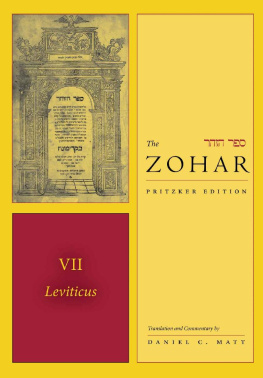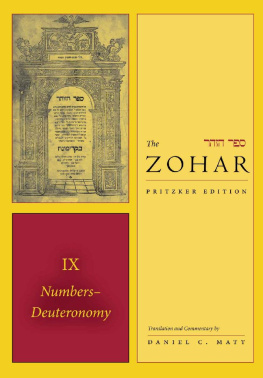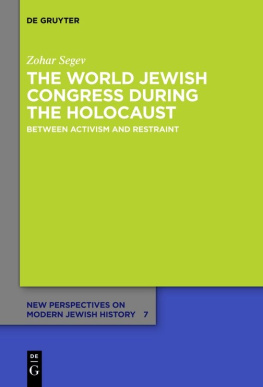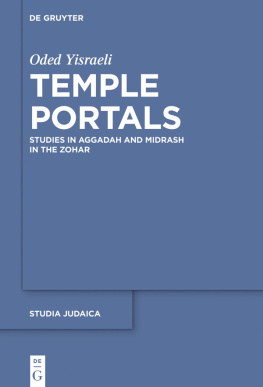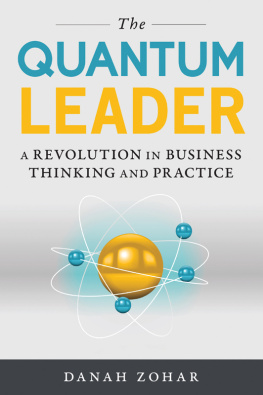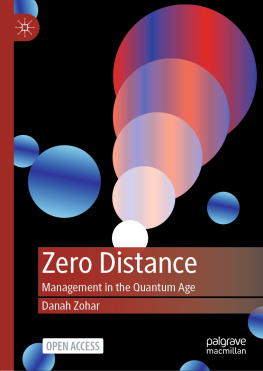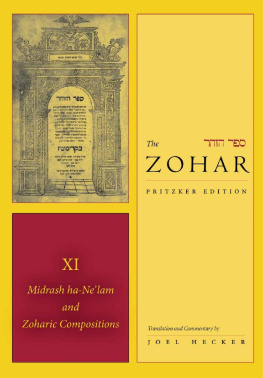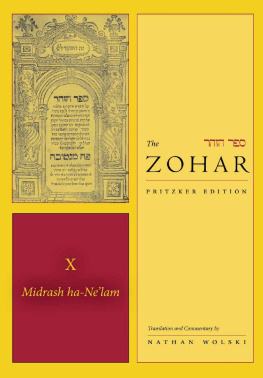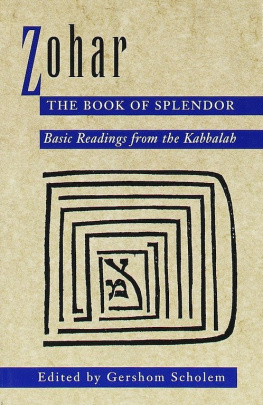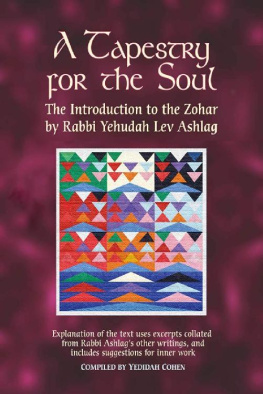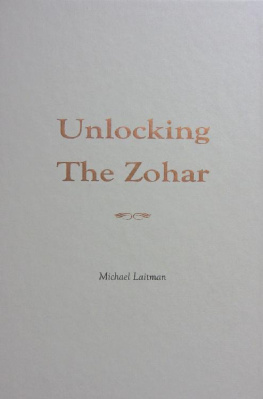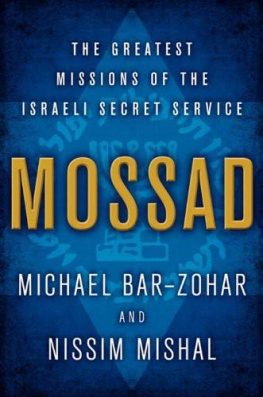Daniel C. Matt - The Zohar (The Zohar: Pritzker Edition) Vol 7: Leviticus
Here you can read online Daniel C. Matt - The Zohar (The Zohar: Pritzker Edition) Vol 7: Leviticus full text of the book (entire story) in english for free. Download pdf and epub, get meaning, cover and reviews about this ebook. year: 2019, publisher: Stanford University Press, genre: Children. Description of the work, (preface) as well as reviews are available. Best literature library LitArk.com created for fans of good reading and offers a wide selection of genres:
Romance novel
Science fiction
Adventure
Detective
Science
History
Home and family
Prose
Art
Politics
Computer
Non-fiction
Religion
Business
Children
Humor
Choose a favorite category and find really read worthwhile books. Enjoy immersion in the world of imagination, feel the emotions of the characters or learn something new for yourself, make an fascinating discovery.
- Book:The Zohar (The Zohar: Pritzker Edition) Vol 7: Leviticus
- Author:
- Publisher:Stanford University Press
- Genre:
- Year:2019
- Rating:3 / 5
- Favourites:Add to favourites
- Your mark:
- 60
- 1
- 2
- 3
- 4
- 5
The Zohar (The Zohar: Pritzker Edition) Vol 7: Leviticus: summary, description and annotation
We offer to read an annotation, description, summary or preface (depends on what the author of the book "The Zohar (The Zohar: Pritzker Edition) Vol 7: Leviticus" wrote himself). If you haven't found the necessary information about the book — write in the comments, we will try to find it.
The Zohar (The Zohar: Pritzker Edition) Vol 7: Leviticus — read online for free the complete book (whole text) full work
Below is the text of the book, divided by pages. System saving the place of the last page read, allows you to conveniently read the book "The Zohar (The Zohar: Pritzker Edition) Vol 7: Leviticus" online for free, without having to search again every time where you left off. Put a bookmark, and you can go to the page where you finished reading at any time.
Font size:
Interval:
Bookmark:

The translation and publication of the Zohar is made possible through the thoughtful and generous support of the Pritzker Family Philanthropic Fund.
Stanford University Press
Stanford, California
2012 by Zohar Education Project, Inc.
All rights reserved.
For further information, including the Aramaic text of the Zohar, please visit www.sup.org/zohar
Library of Congress Cataloging-in-Publication Data
Zohar. English.
The Zohar/translation and commentary by Daniel C. Matt.
Pritzker ed.
v. cm.
Text includes some words in Hebrew and Aramaic.
Includes bibliographical references.
ISBN 978-0-8047-8305-7 (cloth)-
ISBN 978-0-8047-8617-1 (electronic) (vol. 7)
1. Bible. O.T. PentateuchCommentariesEarly works to 1800. 2. CabalaEarly works to 1800. 3. Zohar. I. Matt, Daniel Chanan.
II. Title.
BM525.A52 M37 2003
296.162-dc22
2003014884
Printed in the United States of America
on acid-free, archival-quality paper.
Designed by Rob Ehle
Typeset by El Ot Pre Press & Computing Ltd., Tel Aviv,
in 10.5/14 Minion.
Academic Committee
for the Translation of the Zohar
Daniel Abrams
Bar-Ilan University
Joseph Dan
Hebrew University
Rachel Elior
Hebrew University
Asi Farber-Ginat
University of Haifa
Michael Fishbane
University of Chicago
Pinchas Giller
American Jewish University
Amos Goldreich
Tel Aviv University
Moshe Hallamish
Bar-Ilan University
Melila Hellner-Eshed
Hebrew University
Boaz Huss
Ben-Gurion University
Moshe Idel
Hebrew University
Esther Liebes
Gershom Scholem Collection, Jewish National and University Library
Yehuda Liebes
Hebrew University
Bernard McGinn
University of Chicago
Ronit Meroz
Tel Aviv University
Charles Mopsik,
Centre National de la Recherche Scientifique
Michal Oron
Tel Aviv University
Haviva Pedaya
Ben-Gurion University
Bracha Sack
Ben-Gurion University
Elliot R. Wolfson
New York University
Arthur Green
Co-Chair
Brandeis University
Rabbi Yehiel Poupko
Co-Chair
Jewish Federation of Chicago
Margot Pritzker
Chair, Zohar Education Project, Inc.
Daniel C. Matt
Translator, Zohar Education Project, Inc.
Contents
DANIEL C. MATT |
Parashat Va-Yiqra |
Parashat Tsav |
Parashat Shemini |
Parashat Tazria |
Parashat Metsora |
Parashat Aarei Mot |

This volume covers more than half of the Zohars commentary on the book of Leviticus. How does the Zohar deal with a biblical text devoted largely to animal offerings, grain offerings, and priestly ritual? Here these ancient laws and procedures are spiritualizedtransformed into symbols of Gods inner life. For example, the ascent offering, which was totally consumed on the altar, is known in Hebrew as olah (literally, that which ascends). In the Zohar, this symbolizes Shekhinah, last of the ten sefirot (divine potencies), who ascends to unite with Her beloved, the blessed Holy One.
The biblical narrative describes how two of Aarons sons, Nadab and Abihu, offered alien fire before YHVH and were immediately consumed in a divine blaze. Rabbinic tradition suggested various reasons why they were killed: they lacked the proper priestly garments, or had not ritually washed their hands and feet, or were drunk, or had refused to marry. For the Zohar, marriage enables one to imitate the divine union of male and female, and to stimulate that union above. By not marrying, Nadab and Abihu remained incomplete and unfulfilled. According to a related Zoharic passage, their ritual act failed because in their contemplation of the divine qualities they did not include Shekhinah. Without Her, God is incomplete.
One of the famous sayings attributed to the Zohar is The blessed Holy One, Torah, and Israel are all one. As Isaiah Tishby has demonstrated, this precise wording never appears in the Zohar. However, included in this volume is a similar formulation: There are three rungs, interlinkedthe blessed Holy One, Torah, and Israel.
Also included in this volume is the remarkable image of the golden cord (or rope or chain), supposedly attached to the leg of the high priest before he entered the Holy of Holies on Yom Kippur. At this crucial moment, the priest undertook the mission of securing atonement for the entire people. If he
Professor Ronit Meroz of Tel Aviv University, whose work has dramatically advanced the study of the manuscripts of the Zohar, has generously shared with me the data that she has collected relating to hundreds of these manuscripts, along with her analysis. Her research has provided me with a panoramic perspective of the manuscripts, helping me to determine their reliability. For this, I thank her deeply.
I am grateful as well to Merav Carmeli, who continues to comb Aramaic manuscripts of the Zohar, preparing lists of variants. This precious material enables me to establish a critical Aramaic text, upon which this translation is based.
I want to thank Dr. Jonatan Benarroch for preparing digital copies and precise lists of numerous Zohar manuscripts. My learned daughter, Michaella Matt, has offered invaluable assistance by conducting research in the Jewish National and University Library in Jerusalem. As with the preceding six volumes, Rabbi Joe Blair has composed the Index of Sources with meticulous care.
The critical Aramaic text corresponding to the first seven volumes of The Zohar: Pritzker Edition is available on the website of Stanford University Press. My brother, Rabbi Jonathan Matt, has kindly and meticulously edited a user- friendly version of this text.
D.C.M.
_____________
. The three elements of this saying can appear in various sequences.
.
. For a description of the various online versions of the critical text, see the website. For my methodology in constructing this text, see the website and Volume 1, Translators Introduction, xvxviii.
T H E Z O H A R
[3b]He called to Moses, and YHVH spoke to him from the Tent of Meeting, saying (Leviticus 1:1).
R abbi iyya opened, I have come into my garden, my sister, bride; I have plucked my myrrh with my spice, I have eaten my honeycomb with my honey, I have drunk my wine with my milk. Eat, companions! Drink and be drunk, lovers! (Song of Songs 5:1). The beginning of this verse does not match its end, nor the end its beginning! It is written I have eaten my honeycomb with my honey, I have drunk my wine with my milk. And then, Eat, companions!
Font size:
Interval:
Bookmark:
Similar books «The Zohar (The Zohar: Pritzker Edition) Vol 7: Leviticus»
Look at similar books to The Zohar (The Zohar: Pritzker Edition) Vol 7: Leviticus. We have selected literature similar in name and meaning in the hope of providing readers with more options to find new, interesting, not yet read works.
Discussion, reviews of the book The Zohar (The Zohar: Pritzker Edition) Vol 7: Leviticus and just readers' own opinions. Leave your comments, write what you think about the work, its meaning or the main characters. Specify what exactly you liked and what you didn't like, and why you think so.

